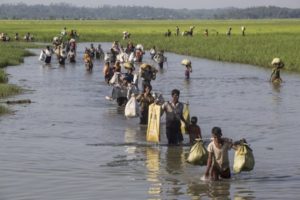Rohingyas were fleeing Rakhine into Bangladesh. Photo collected.
by Xiajun Chen 3 November 2022
More than five years after the Rohingya massacre, the Rohingya refugees are still experiencing extreme hardships in refugee camps. In the past October, two Rohingya leaders in a refugee camp were killed by a local mob who tried to exert control over drug trafficking in the area. In late November, my class had a conversation with a Rohingya refugee in Cox Bazar through the Global Engagement Portal. During our conversation, he also acknowledged that criminal activity is going on in the camp almost every day.
In the past years, several major human rights crises happened in Asian countries, but there has been little progress made in resolving these issues. There are no charges against the Myanmar junta for crimes against humanity by the international criminal court. Neighboring South Asian countries are reluctant to accept refugee groups and intervene in the atrocities committed by the Myanmar junta.
Human rights discussions are not among the dominant topics of discussion in Southeast Asian countries. Sovereignty issues, economic coalitions, and territorial disputes often marginalize the voice of human rights activists in Southeast Asia’s regional affairs. Although the establishment of ASEAN and its involvement in the refugee crisis marked a collective effort toward human rights development by member countries, ASEAN only has limited impact without the support of its member states. Under the Westphalian system, nation-states hold key voices in international affairs. International organizations can only have a finite influence on domestic politics. In addition, most Asian countries use non-interference with other countries’ internal politics as a guideline for foreign policies. This dominant nation-state view can often leave human rights crises unresolved because human rights issues often arise within national borders, even though they have transnational impacts.
Furthermore, most Southeast Asian countries are not willing to engage in human rights discussions because they feared the imprinting of western liberalism as a practice of neocolonialism. After WWII, self-determinism became a major governing principle around the world. While political rights are often the center of western liberal human rights discussion, Southeast Asian countries are concerned that western liberalism challenges their state sovereignty. When the UN General Assembly constructed the Universal Declaration of Human Rights, Southeast Asian countries only had limited representations. Therefore, the document’s universality often did not apply to Asian countries. Limited public awareness of the UDHR led to few human rights discussions in the region.
However, the Asian community should develop our human rights language because human rights ideas can often be found in various Asian cultures and are not unique to western philosophers. According to an Indian philosopher, Amartya Sen, human rights ideas are contained in Confucian teaching, Buddhist doctrine, Sanskrit text, and Muslim culture. Profound Asian traditions provide relevant insights for the relief of the stateless Rohingya refugees. Buddhism teaches that we should tolerate people from different backgrounds; Moghul emperor Akbar enacted laws for religious tolerance. While the Rohingya refugees are wandering on the border or held in immigration detention, these teachings can be sources of humanitarian policy to accept refugee groups into national borders and provide them with a place in their societies. Furthermore, this Buddhist teaching is specifically applicable to the prevalent Buddhist nationalism among Myanmar people. As a state with a majority of the Buddhist population, Myanmar should acknowledge these inclusive teachings in the Buddhist tradition.
In 1948, when P. C Chang represented nationalist China in the drafting of the Universal Declaration of Human Rights, he emphasized the concept of brotherhood in Confucius’s culture. According to Chang, humankind has shared bondage as brothers and sisters. This bond between mankind should be embodied in the policies regarding the Rohingya people. Under the brotherly relationship, it is our duty to provide relief for the refugee groups as their neighbors, and friends. More importantly, the development of human rights needs the collective effort of Southeast Asia countries to foster a friendly and encouraging environment for various opinions. These Asian traditions and doctrines should be the profound heritage of our community to promote the human rights language and the Universal Declaration of Human Rights.
The refugee and sovereignty issue is also a complicated global issue. Encouraging human rights discussions and the influx of a large population will inevitably pose threats to political stability. However, ignoring the issue will only cause more chaos and conflicts. Therefore, both short-term solutions and long-term reforms should be implemented. First, it is crucial for the Myanmar government to respond to the issue; while the military government has large control over the region, international communities should put more pressure on the government to push for top-down reforms, while, at the same time, providing support to local activists for bottom-up protests. Second, the neighboring countries should implement refugee policies to accept refugee groups into their society with maximum effort. Third, as the issue prolonged, the international community should provide financial aid and education resources to ensure the welfare of people in refugee camps and help the growth of the next generation. Since a structural political change in Myanmar will not happen in the short term, the neighboring countries need to provide immediate relief for the stateless Rohingya people.
Furthermore, we should acknowledge that human rights are a shared language of the entire humanity because the Rohingya refugee issues are not a regional issue, but an international issue. While the ancient Asian traditions function an instrumental role in its development, it is not a tool to encourage divergence between the dichotomous East vs. West views on human rights. Confucius says “the goals of self and others can be unified, thus the world can be harmonized.” Although human rights discussions can vary across places, the fundamental concepts of human life, dignity, and freedom in the UDHR should not be altered. As the slogan of the 2008 Beijing Olympics, “One World, One Dream,” advocates, the international community should act collectively to embody the dream of equality and freedom and make human rights language the language of the world.

